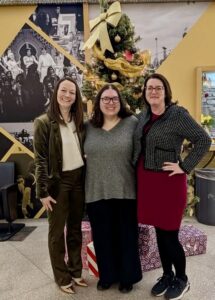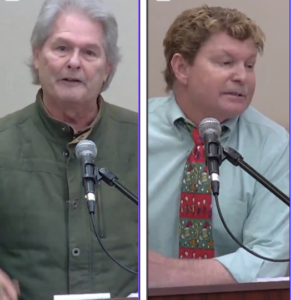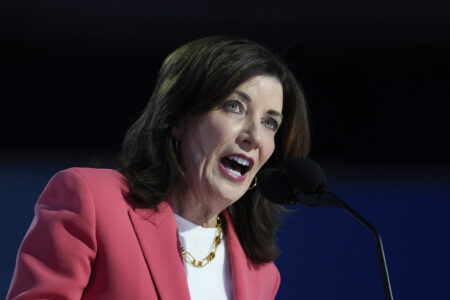Pastors react to SCOTUS Ruling on Capacity
Even as coronavirus cases continue to appear nationwide, a recent decision by the United States Supreme Court could place limits on New York state’s ability to place restrictions on places of worship, receiving mixed reactions from local faith leaders in Chautauqua County.
In a 5-4 decision, the justices favored the side of the Roman Catholic Diocese of Brooklyn and Agudath Israel of America, which have churches and synagogues in areas of Brooklyn and Queens that were previously designated red and orange zones. In those red and orange zones, the state had capped attendance at houses of worship at 10 and 25 people, respectively. But those particular areas are now designated as yellow zones with less restrictive rules neither group challenged.
“The restrictions at issue here, by effectively barring many from attending religious services, strike at the very heart of the First Amendment’s guarantee of religious liberty,” the opinion said.
The opinion noted that in red zones, while a synagogue or church cannot admit more than 10 people, businesses deemed “essential,” from grocery stores to pet shops, can remain open without capacity limits. And in orange zones, while synagogues and churches are capped at 25 people, “even non-essential businesses may decide for themselves how many persons to admit.”
The Rev. Luke Fodor, pastor at St. Luke’s Episcopal Church in Jamestown, said that the legal discussion surrounding religious freedom and capacity is a “complex conversation,” calling it “not a victory, but a loss all around.”
“Rights and respecting rights are important,” said Fodor. “But with rights comes great responsibility. It’s unfortunate that we had to get to the point where we had to get to the court to talk about rights and that right of gathering. It’s unfortunate that we came to a point where we had to make sure we can fight for our rights. It’s unfortunate that we weren’t responsible so that these two had to come into conflict.”
Among the most frustrating parts of trying to hold services and masses once churches were allowed to reopen has been the changing capacity limits on little-to-no notice, the Rev. Dennis Mende, pastor at Holy Apostles Parish in Jamestown, said.
“We started out with 25% capacity, then all of a sudden that went up to 33% without any prior notice or any real public notice,” he said. “Then somewhere along the line that went up to 50% and what seems to be the overarching guideline is whatever the building capacity is, when the social distancing requirements are applied, then that determines the percentage of what the full capacity could be. So it can vary from church to church.”
Still, Mende disagreed with the notion that the restrictions enforced by the state present an affront to religious freedom.
“I say that because one of the guidelines that has been in place since the time of St. Paul’s writings are that you live with respect for the governing bodies,” he said. “St. Paul urged the people, even though it was the adverse effect of the Roman government, you respect that. You live a good citizen. And I do believe that guideline is entirely appropriate. I have no problem with that whatsoever.”
Nettie Puleff, pastor at First United Methodist Church in Fredonia, agreed. Her congregation has since transitioned back to livestreamed services due to the COVID-19 increase in Chautauqua County.
“We’ve been careful enough for one another, we probably would have made those decisions yourself,” she said. “Honestly, with the way our church works out, six-feet social distancing is where he would have proposed a percentage, it works out to be the same. We haven’t had a whole lot of conflict around the area.”
“We’re more concerned about the safety of people long term than about exercising our religious freedom,” Fodor added. “The freedom we have is to love our neighbor and we all have to make that decision as to what our love looks like. I’m conscious of keeping attendance down at the moment and keeping it not too packed.”
The Rev. Joseph Walter, pastor at St. Anthony and St. Joseph parishes in Fredonia, praised the court’s decision, but said the different “vulnerabilities” that exist within the faithful must be respected.
“God gave everybody a brain, he expects us to use it,” he said. “The diocese has a number of protocols in place and we’re following those religiously. Any medical professionals that I’ve spoken with have said, ‘Nobody’s gonna catch COVID-19 with all of the things you’re doing in your churches.’ People are completely safe.”
Walter said that he disagreed with Cuomo’s restrictions not on their merit, but solely on their overreach given that the church is “self-regulating.”
“We have a responsibility to do that,” he said. “Of course we do. We love our people more than the governor does and we want them to be safe. But the other thing is, you hear people talk about separation of church and state and that is what (the court’s decision) is about. We are being faithful in following our bishop’s instructions and the people he has put in charge of that. We’re being responsible and I’m happy with that. I very much like the Supreme Court ruling that they recognize that that’s not something for Gov. Cuomo to decide.”
But, churches also have a “responsibility to listen to the science,” Walter said.
‘Because we’ve been using that brain God gave us and because we’ve been careful there are no cases traced to churches,” he said. “It’s better than the government focus its energy where it needs to. We’ve been open for months and months. The other thing, too, is for many people being able to come together and worship is something that is essential. There are many things to be considered here and it’s important.”
Nevertheless, Fodor said he is “saddened” that the court had to intervene and hopes that ministry can continue to do the work needed for people during this time.
“I think we need to think not about fear, but about love and think not about what we can do for ourselves, but how we can serve the community,” he said. “I think about how we can use our privilege to serve others, not to fight for my right to hold a service. Not to say that services aren’t important. That’s part of our mission, too, but I’m saddened by the whole scenario. It breaks down the sense that people forget to be responsible. It’s a human reality…. But also, how do we speak to the good and how do we serve the poor? And that’s the work that I try and think through. As I make decisions, I don’t look to the Supreme Court to help me make my choice in that regard.”





